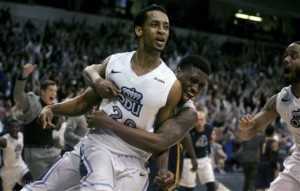 I saw a tremendous finish to a college basketball game the other night, one of the best I’ve seen live. Maybe the best. I was sitting just to the left of the basket, at a media table, when Trey Freeman banked in his running 3-pointer that beat Murray State and sent Old Dominion to the NIT semifinals next week at Madison Square Garden.
I saw a tremendous finish to a college basketball game the other night, one of the best I’ve seen live. Maybe the best. I was sitting just to the left of the basket, at a media table, when Trey Freeman banked in his running 3-pointer that beat Murray State and sent Old Dominion to the NIT semifinals next week at Madison Square Garden.
(Jason Hirschfeld photo)
The ball arced from about 30-feet away. It banked into the basket cleanly. And the white-noise eruption of multiple jet engines, or something like it rising from the seats and bouncing off the ceiling, ensued. And it sustained for many minutes of pure delirium at the Constant Center.
Yet I barely moved a muscle the entire time, except for my fingers pounding a keyboard and my eyes scanning a stat sheet. I was working as a freelancer for the Associated Press. And it was my job to file a short story on the game immediately, if not sooner, after the horn sounded.
So I stayed calm, composed my words and hit the “send” button mere seconds into that swirl of chaos.
But I wondered as I left The Ted a bit later, after refiling a story with quotes from players and coaches, how I’d have reacted had I not been on the clock, but rather just a patron in the stands.
I didn’t have to ponder long, though, because I’d been in similar situations, and so I already knew the answer. I would have looked on with a large measure of minimal reaction. I’d have recognized the magnitude and serendipity of the moment, certainly, and probably uttered a “Wow” or an “Oh my God” or “Well, how about that?” to my seat-mates. Would have offered appropriate applause for the athletic drama.
But go crazy? Lose a lung bellowing? Rush the court? Feel lifted on wings, somehow, the next day or two? Not quite. That shipped sailed long, long years ago, if it ever really floated in the first place.
No cheering in the press box is right, and proper. It is a workplace, not a wing joint. And so working in sports journalism — and I started part-time in college — stripped from me all but the most deep-seated fragments of “fan” that percolate to the surface, for this child of Philly sports, only occasionally via an Eagles or Phillies game.
So it was during some of the greatest, most famous sports moments I was blessed to cover as a writer: Kirk Gibson’s World Series home run in 1988. Keri Strug’s gold-clinching vault in the ’96 Olympics. Payne Stewart’s putt to win the ’99 U.S. Open. They happened. I soaked it in. And with the crowd noise bursting my ear drums, my brain immediately began forming words and sentences. No time for emotion. No instinct toward emotion, really. Labor needed to be performed.
But react impassively often enough and “impassive” becomes a default state. That’s the danger. It drills so deeply into the nervous system, this requisite detachment, it infiltrates personal spaces and behaviors far from the arena. It did for me, I admit. So let me re-state that thesis as a singular assessment.
Still, as I ruminated on my ride home from a Ted gone bonkers, I truly was pleased I had witnessed what I had witnessed, and also that I’d been able to provide the news-service story read by much of the country — well, anyone who cared about the game anyway.
Had you looked at me before, during and after that ball banked through, however, you’d have had no clue to my satisfaction for having added a cool, great moment to my mental menu. I know that is unfortunate collateral damage of the task-focused, neutrality-required, deadline-driven vocation in which I trafficked for so long.
There’s no crying in baseball, and there’s no emotion — if it can be helped — in writing about the pulsing emotion of sports. That’s irony not lost on a sports “fan” lost long ago.
![]()

Fine commentary. Your readers are fortunate you’ve chosen to be the balanced observer.